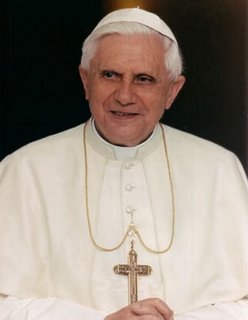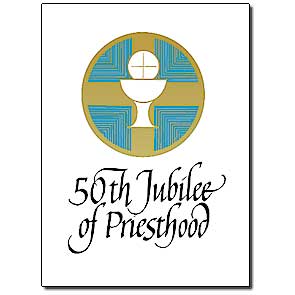 Wilfred, Emily, Paula, and Wilfred, Jr. at the end of the evening.
Wilfred, Emily, Paula, and Wilfred, Jr. at the end of the evening.(Twenty-fifth Sunday of the Year (B): This homily was given on
[For the audio version of this homily, click here: Twenty-fifth Sunday 2006]
This truth was illustrated in a powerful way in an old Twilight Zone episode called, “The Masks.” It’s the story of a wealthy old man named Jason Foster, who’s sick and very close to death. On the night he knows he’ll die he calls in his 4 heirs: Wilfred, Emily, Paula and Wilfred, Jr.
When they first arrive on the scene, they pretend to be sad and upset that Jason’s about to leave them. They do their best to put on a good act. But Jason isn’t fooled, and he tells them so. He says that he knows how they really feel deep down inside: they can’t wait for him to “kick the bucket”, so to speak, so that they can take his money and property and divide it among themselves.
Then he tells them that they will soon have their wish fulfilled. His estate will indeed be theirs within a very short period of time—but only on one condition: they must all wear masks over their faces and not take them off until
But these aren’t ordinary Halloween masks: Jason has had them specially made for his 4 relatives. Each has been designed to match some aspect the character of the relative who would put it on. The first, for example, has the expression of a selfish miser; the second has the expression of a coward; the third has the face of a vain person; and the fourth the look of a sadist. (As you might imagine, these were very UGLY masks!)
Many hours go by; the 4 heirs complain about the masks as they become more and more uncomfortable to wear. But they do manage to keep them on, until, at last, the clock strikes
At that moment, Jason dies; he passes away in their presence. And they rejoice! Now at long last they’ll have what they want. But not so fast! In a typical “Twilight Zone twist”, they end up paying a very big “price” for their inheritance. When they take off their masks, they suddenly discover that their faces have been disfigured—permanently disfigured. Each of them has taken on the ugly, grotesque image of the mask they had been wearing.
Deal with it—or it will deal with you.
In this Twilight Zone episode, Rod Serling was trying to help us understand that whatever is inside of a person—good or bad—will eventually come out, and be revealed to others. If our heart is filled with faith, hope, and charity, for example, that fact will eventually become clear to those we live with and work with and interact with every day. And they will be greatly blessed in the process—through our loving words and actions!
If, on the other hand, we have unresolved anger, or unforgiveness, or some other negative attitude inside of us—like the 4 heirs in this story did—that fact will also become evident to those around us at some point in time. And they will not be blessed in the process! Quite oppositely, they’ll be forced to cope with our uncharitable actions and our uncharitable words!
And so we have to deal with it! Whenever necessary, we have to deal with the negative attitude or emotion—or temptation—that we find in our heart, or it will deal with us by leading us into sin.
Deal with it—or it will deal with you.
Providentially, all 3 of our Scripture readings today make this point for us, although in slightly different ways.
In our first reading we hear a prophetic text from the Book of Wisdom, chapter 2: a text that was fulfilled in Jesus Christ, our Lord and Savior, about a hundred years after it was written. It was fulfilled, of course, during Holy Week. The passage speaks of an innocent man who was persecuted and eventually killed by his enemies.
Why?
Because they were filled with anger and envy and they didn’t deal with it! They’re quoted as saying, “Let us beset the just one because he is obnoxious to us; he sets himself against our doings, reproaches us for transgressions of the law and charges us with violations of our training.”
They failed to deal with their envy and anger, and so it “dealt with them”—by leading them to kill an innocent human being. As they say toward the end of the text, “Let us condemn him to a shameful death.”
This passage, sad to say, could easily have been written about modern-day terrorists. Terrorists are filled with rage and very often they’re also filled with envy—and they don’t deal with any of it. Nor do they care to! So it deals with them—and the rest of the world suffers the consequences.
His implicit message there is simple: Deal with it; deal with whatever disordered passion is making war within your members—or it will most certainly deal with you!
(This, incidentally, is one reason why it’s a good idea to go to Confession regularly—even if you don’t have any mortal sins on your soul!)
And this disordered passion that St. James speaks about can be something as common—and as subtle—as pride! In today’s Gospel text from Mark 9 Jesus confronts his 12 apostles about an argument they had been having among themselves on their journey to
That was the substance of their quarrel. But the argument didn’t just “happen”! It had a root cause: pride! Each of these men had sinful pride within him, and each of these men failed to deal with it through repentance. Consequently pride “dealt with them”—by leading them into a verbal battle-royal that could have permanently destroyed the relationship they had with one another.
If you need any further proof that dealing with our disordered passions is extremely important, all you need to do is think of the recent actions of some Muslims who were deeply upset at what Pope Benedict said at the University of Regensburg on September 12. These extremists burned the pope in effigy, shot a Catholic nun, and firebombed 7 churches in the
And they want us to call their religion “the religion of peace”? Be clear about it: actions like theirs do not lead to peace.
So if you’re feeling some unjustified anger in your heart right now, please deal with it! (Ask the Lord for that grace when you receive him today in the Eucharist.) Or know that it will deal with you.
By the same token, if you’re experiencing some other “disordered passion” now or in the future: the temptation to be lustful, or envious, or gluttonous, or greedy, or slothful, or prideful—make a resolution today to deal with it as soon as you recognize it. Or understand that it will deal with you.
This is the simple and clear warning that God gives us today through his holy word.
He gives it to us because he loves us and wants us to be happy.
May he also give us the grace to take it seriously.


